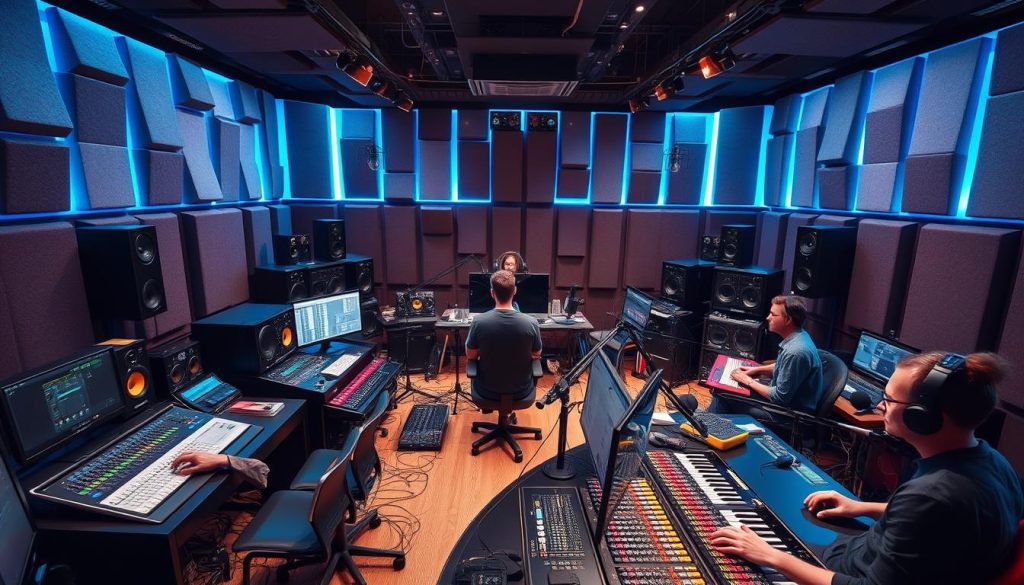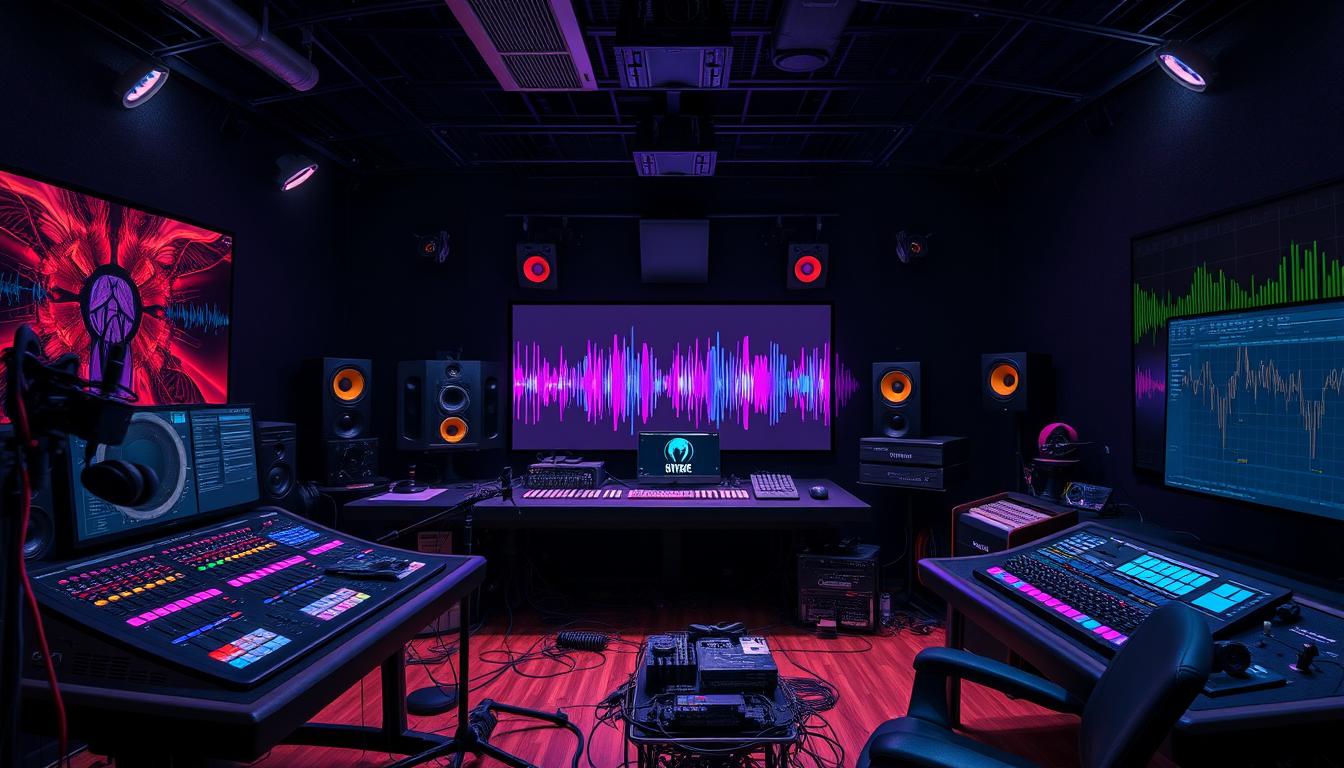Let’s start an exciting journey into audio production together. We’ll explore the key ideas of audio engineering. You’ll see how science and art come together to make the sounds we love.
Audio engineering is all about making, changing, and playing back sound. It’s a world where every detail counts, from where the mic is placed to how tracks are mixed. Engineers are key in making the sounds we enjoy in music, movies, and live shows.
We’ll look into how high-quality audio is made. You’ll learn about the skills and steps engineers use to make their ideas real. Get ready to dive into audio engineering, sound production, music production, audio recording, audio mixing, and audio mastering.
Let’s start this amazing journey together. We’ll see where science and art meet in audio engineering. You’ll learn the basics, tools, and methods to become a pro in audio production. Let’s make incredible soundscapes together.
Journey into the Captivating World of Audio Engineering
The history of audio engineering is a journey through time. It shows how sound recording and technology have changed. From old mechanical methods to today’s digital age, it’s a story of big changes.
The Evolution of Audio Engineering
Old audio engineers used big machines to record and play back sound. Vinyl records and reel-to-reel tapes were big steps forward. They helped create the detailed sounds we love today.
The Impact of Modern Technology
The digital era changed audio engineering a lot. Fast computers, new software, and precise tools gave engineers more control over sound. Moving from analog to digital opened new doors. It let engineers try new things in sound recording.
| Technology | Advantages | Disadvantages |
|---|---|---|
| Analog Audio | Warm, natural sound quality | Limited flexibility, susceptible to noise and degradation |
| Digital Audio | Precise control, versatility, and flexibility | Potential for digital artifacts, sometimes perceived as “cold” or “sterile” sound |
Looking into audio engineering, we see how analog and digital mix. This mix shows the ongoing growth and new ideas in this field.
Fundamental Concepts: Building Blocks of Sound

Sound is something we hear every day, but its secrets are often missed. For audio engineers, knowing the basics of sound is key. Let’s look at the basics that make audio work.
Understanding Sound Waves
Sound comes from vibrations. These vibrations make sound waves that move through things like air and solid objects. The size, shape, and strength of these waves tell us what sound we hear.
Importance of Acoustics
Acoustics is all about how sound moves in places. It shows us how sound spreads, bounces off things, and changes in rooms. Knowing this helps make places like concert halls and studios sound great.
Digital vs. Analog Sound
There’s a big debate over analog and digital sound. Analog sound is warm and full, while digital sound is clear and precise. Knowing the differences helps audio engineers make great sound choices.
We’ve seen how sound waves, acoustics, and analog vs. digital sound are key to audio engineering. Mastering these basics will help you become a great audio pro.
Key Principles of Audio Engineering
Sound recording and processing starts at the sound source and ends in your listener’s ear. Understanding the audio signal flow is key in audio engineering. This flow includes many parts, each adding to the final sound. From the sound source to the speakers, mastering the audio signal chain is vital.
It helps you fix problems, see how each part affects your sound, and shape your audio as you want.
Gain Staging
Managing your audio signals’ levels is crucial in audio engineering. This is called gain staging. It means adjusting the levels at each step of the audio routing to avoid distortion and noise. Good gain staging keeps your sound clean and clear.
Poor gain staging can cause distortion and noise, ruining your audio quality.
Equalization
Equalization (EQ) is a key tool for audio engineers. It lets you balance your audio’s frequencies. EQ fixes problems or shapes the sound to match your vision.
It involves boosting or cutting frequencies, knowing the Q factor, and using different EQ types like parametric, graphic, and shelving.
Compression
Compression is vital in audio engineering. It controls your audio’s dynamic range. By reducing loudness differences, it makes your audio more consistent.
It has settings like threshold, ratio, attack, and release. Proper compression makes your audio clear and polished. But too much can make it sound dull.
Essential Tools for Audio Engineers
As an audio engineer, having the right tools is key to improving your sound. From hardware to software, each tool is important for the final sound. Let’s look at the must-have audio engineering tools for your creative goals.
Microphones: The Voice of Your Sound
Microphones are the start of audio engineering. They catch the raw sounds you’ll then shape. Good microphones, like condenser, dynamic, and ribbon mics, make your recordings clear and deep.
Audio Interfaces: The Conduit for Your Sounds
Audio interfaces connect your instruments and mics to the digital world. They turn analog signals into digital ones. This makes sure your audio production tools and recording studio gear work together smoothly.
Monitors and Headphones: Critically Listening
Good monitoring is key for audio engineering. High-quality studio monitors and headphones let you listen to your mixes closely. This ensures your final product sounds balanced and polished.
Mixers and DAWs: Shaping the Sound
Mixing consoles and DAWs are central to audio engineering. They let you control every part of your audio. You can mix, balance, and perfect your recordings with these tools.
While the best audio engineering equipment is important, your skills and listening skills matter too. With the right tools and skills, you’ll be making great audio productions in no time.
Mastering: The Final Polish
Mastering is the last step in making music. It’s key to making your music sound great and clear. A skilled engineer, called a mastering engineer, works on your music. They make it sound professional and polished.
The Role of Mastering Engineers
Mastering engineers have a great ear for music. They can spot small issues missed in mixing. They use special tools and methods to fix the sound. This makes your music sound good on any speaker.
Should You Use a Mastering Engineer?
You can try mastering your music by yourself, but hiring a mastering engineer is better. They have top-notch gear and know how to make your music sound amazing. This is a smart choice for audio producers who want their music to sound great everywhere.
Whether to hire a mastering engineer depends on what you want and your budget. But if you want your music to sound its best, a pro mastering engineer is a good idea. They make your mastering process better.
Roles and Responsibilities in Audio Engineering

The world of audio engineering is full of different jobs, each one important for making great sound. If you want to be an audio engineer, it’s key to know these jobs. This helps you find where you fit best.
Recording engineers are key. They capture sound with great skill. They set up mics and manage the sound flow, making sure every detail is perfect.
Mixing engineers are also vital. They mix different sounds together into one complete sound. They use their skills to balance sounds, making the final mix sound great.
There are more jobs too, like live sound engineers, post-production experts, and sound designers. Live sound engineers make sure shows sound good to the audience. Post-production experts work on movies and games. Sound designers create sounds that take us to new worlds.
All audio engineers need to know a lot about sound, use equipment and software well, and work well with others. They work with artists, producers, directors, and clients.
As you start in audio engineering, look at all the different jobs. Find where your skills and interests match. With hard work and a love for learning, you can do amazing things in the world of sound.
| Audio Engineering Roles | Key Responsibilities |
|---|---|
| Recording Engineer | Capturing and documenting sound, managing signal flow, microphone setup |
| Mixing Engineer | Blending individual recordings into a cohesive mix, balancing instruments, vocals, and effects |
| Live Sound Engineer | Ensuring optimal sound quality and audience experience at concerts and events |
| Post-Production Engineer | Enhancing audio for film, television, and video games |
| Sound Designer | Creating immersive aural landscapes and sound effects |
Sound Engineering Basics: Master Audio Production
We’ve looked at the cool world of audio engineering. We’ve covered sound waves and the rules of signal flow and equalization. Now, let’s put it all together to master audio production. If you’re into music, sound engineering, or just love making audio, these basics will boost your skills.
Great audio production needs a deep understanding of sound production techniques. You must know how to place microphones and manage gain. With these skills, you can capture your audio’s best parts. This makes your mix sound professional.
- Learn about sound waves: Know how different sounds affect what we hear. Use this to make better choices in recording and mixing.
- Understand room acoustics: See how the room affects sound. Learn how to make your recording space better for sound.
- Know digital and analog audio: See what each has to offer. Use both to make your audio the best it can be.
Keep learning in audio engineering. Mastering it takes practice, trying new things, and always seeking more knowledge. With these audio engineering basics, you’ll get better at sound production techniques and audio recording tips.
Unleashing Creativity with Audio Engineering Techniques
As an audio engineer, I’ve learned that our field is full of creative potential. It’s not just about the technical stuff like signal flow and gain staging. It’s also about using modern tools and software to try out different sound design and audio manipulation techniques.
This lets us create unique sounds and atmospheres that take listeners on a journey. By playing with digital samples and effects, we can make sounds that are truly new and exciting. It’s a journey of discovery, where science and art come together to create something amazing.
Audio engineering also lets us get creative with effects processing. We can use everything from dreamy reverbs to cool distortions to change the sound. By using these techniques, we can make our music or soundtracks stand out. It’s a way to add a special touch that makes our work unique.

